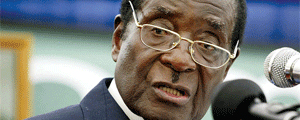
EVEN if he fights like a wounded beast, President Robert Mugabe will not be assured of an outright victory in next year’s elections, analysts have warned. KHOLWANI NYATHI
Mugabe responded to the weekend formal endorsement of his candidature to run for another term by exhorting his lieutenants to “fight back and win all our power back”.
He told the Zanu PF annual conference in Gweru on Saturday that “we are now like a wounded beast”.
Mugabe’s closing speech captured the mood in Zanu PF that the party has turned the corner after an embarrassing performance in the 2008 polls.
Zanu PF blamed factionalism and complacency for the lacklustre performance that saw the party losing its parliamentary majority for the first time since Independence.
Mugabe needed the intervention of violent supporters and suspected security forces to thwart Prime Minister Morgan Tsvangirai’s surge. The Zanu PF leader, who will be 89 when the next polls are held, is seeking to defy old age and ill health to have a landslide victory against the opposition.
But analysts warn that the change in the political landscape is irreversible and an election pitting Mugabe and Tsvangirai will always be close.
“Mugabe has a ‘residual’ electoral base, a chunk of Zanu PF zealots who can ‘die for him’.But in a totally free and fair election, Parliament will be shared between Mugabe, Tsvangirai and (MDC leader Welshman) Ncube,” Harare-based political analyst Rejoice Ngwenya said.
- Chamisa under fire over US$120K donation
- Mavhunga puts DeMbare into Chibuku quarterfinals
- Pension funds bet on Cabora Bassa oilfields
- Councils defy govt fire tender directive
Keep Reading
“Actually, there will be a run-off where both Tsvangirai and Mugabe will attempt to seek Ncube’s share of the vote.”
Trevor Maisiri, a senior analyst for Southern Africa at the International Crisis Group, said the next elections will be decided on what the candidates will have to offer especially on the economic front.
“A Mugabe/Tsvangirai election will always be closely contested,” he said. “This time around people will vote based on who is likely to make the greatest impact on the economy.”
Tsvangirai and his MDC-T, who in the past have been accused of not having any agenda beyond toppling Mugabe, have come up with an economic blueprint.
The blueprint known as Jobs, Upliftment, Capital, Investment and Ecology promises Zimbabweans one million jobs in five years.
It is a direct response to Zanu PF’s indigenisation policy that has been blamed for accelerated job losses and general economic decline.
Maisiri said the indigenisation programme, although populist, might prove to be Zanu PF’s Waterloo in the polls.
“Mugabe’s strategy of speaking about empowerment without really translating it to how it will bring about a dollar into the pocket of my old grandmother in the rural areas, will likely misfire,” he said. “Zanu PF needs to unpack empowerment to how it impacts the empty bowls of starving Zimbabweans.”
He said although empowerment was a progressive policy, it remained elitist and might not help Mugabe to win votes.
“Tsvangirai is, on the other hand, speaking about job creation,” Maisiri said.
“I think that resonates more with the people on the streets and my old grandmother who has been waiting for her grandson to get a job in Harare so he can feed her.”
However, he warned that Tsvangirai still needed to broaden the job creation theme with explanations on how he intended to build foundations for Zimbabweans to participate and own economic channels once the economy revived.
He also said voter apathy remained the greatest impediment to an outright Tsvangirai win.
“Whereas Zanu PF seems to have methodologies (whether right or wrong) of ensuring that its cadres turn out to vote, at all costs, the MDC-T has the challenge of turning its supporters into voters,” Maisiri said.
“It will, however, be a close call election and difficult to predict who will win. All depends on the strategies and policy proposals that each of the them adopts closer to the election.”
Tsvangirai claimed 47,95% of the vote in the last elections against Mugabe’s 43,2%.
Former Finance minister Simba Makoni’s 8,3% share ensured there was no outright winner in the presidential election, necessitating a runoff poll that was overshadowed by political violence.
The elections delivered a hung Parliament with Ncube’s MDC getting the smallest fraction of the vote, but emerging as a power broker. MDC has been on a revival mode and may also spring a surprise in the elections.







